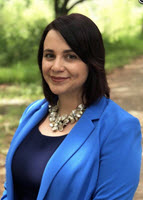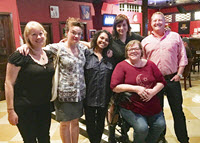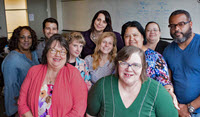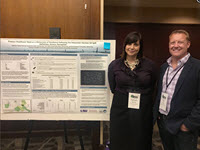
Following the Deepwater Horizon incident, the National Center for Disaster Preparedness surveyed households in highly-affected areas of Louisiana to track the event’s impacts on the physical and social health of coastal families and their communities. Kathryn Keating facilitates subsequent surveys to assess long-term impacts and identify attributes of children and families that are associated with resilience or vulnerability to negative oil spill impacts. The survey’s longitudinal data will help explain how people recover and rebound after a disaster and provide guidance to those who create disaster response plans and organize community support.
Kathryn is a Ph.D. student with the Louisiana State University’s Department of Sociology and a GoMRI Scholar with the project Understanding Resilience Attributes for Children, Youth, and Communities in the Wake of the Deepwater Horizon Oil Spill.
Her Path

Kathryn grew up in Indiana and Central Florida, molding her into a “proud Hoosier” with ties to the Gulf of Mexico. She entered an undergraduate program at Indiana University as a non-traditional adult student after nearly a decade away and discovered her interest in sociology during a “Deviant Behavior and Social Control” course. She took classes in sociology and social work, including a year-long practicum at a local hospital that sparked her interest in medical social work. Kathryn also worked part-time at the county’s emergency youth shelter and volunteered at local social service agencies. She graduated with dual bachelor’s degrees in sociology and social work in 2015.
Kathryn entered Portland State University’s Master of Social Work program in 2015, where she completed a practicum for training mental health professionals to work with underserved populations. While working at a rural Oregon primary care clinic, she developed a passion for working in healthcare and crisis settings in rural areas, where access to and interaction with health and mental health care systems can be significantly different than urban settings. Kathryn decided to continue her development as a “hybrid scholar” through a sociology doctoral program at Louisiana State University in 2016. Once in Louisiana, she became a Licensed Master Social Worker (LMSW). She joined Dr. Tim Slack’s GoMRI-funded project Resilient Children, Youth, and Communities (RCYC) as a research assistant at Louisiana State University and completed a second sociology master’s degree while conducting her Ph.D. research.
“As a person who has lived and worked in rural places for most of my life, I prefer work that allows me to engage with people living in small communities and rural areas,” said Kathryn. “Once I got the ball rolling with my education, I wanted to do right by myself and those who have supported me by making the most of the opportunities I’ve been given while staying true to my values and remembering where I’m from.”
Her Work

Kathryn’s research utilizes longitudinal surveys of Louisiana families that build on 2014 data collected by the Baton Rouge Area Foundation-funded Gulf Coast Population Impact Study (GCPI), led by the National Center for Disaster Preparedness at Columbia University’s Earth Institution, which surveyed households in randomly selected coastal communities who experienced high rates of oiled shorelines and BP compensation claims. The RCYC group conducted a second wave of follow up surveys with the GCPI cohort in 2016 – 2017, and a third wave that is currently underway. “A repeated cross-sectional survey can tell you how the overall population of interest is changing, but not about changes within units of analysis such as individuals, families, or households,” explained Kathryn. “A longitudinal panel survey is a particular type of design where the same sample of people are surveyed at different points in time. By providing repeated measures from the same people at different time points, this type of survey allows us to assess changes in the experiences of individuals over time.”
Kathryn helps coordinate and manage an eight-person field team, who collects follow-up data from families across seven Louisiana parishes. The team conducts face-to-face interviews in participants’ homes with the same parent every two years and collects information about their spill-related experiences, including economic changes, physical and mental health symptoms, healthcare access, neighborhood and community characteristics, and social media use. She and her team also host hour-long focus groups with study participants in each affected community to collect more in-depth qualitative information related to the survey topics.

Kathryn’s master’s research included results from the first- and second- wave surveys and focus groups on how affected families access and interact with community healthcare resources. She used this data to examine how federal and state entities define healthcare need and how these definitions relate to the actual needs of those affected by Deepwater Horizon. She then integrated her findings with data from the Health Resources and Services Administration to further establish how community-level health needs relate to individual recovery from the spill. Her Ph.D. research builds on her master’s work and includes third-wave survey data and qualitative focus group responses to examine change-over-time in child and family disaster outcomes and the role of healthcare and primary care resources in disaster resilience. Kathryn recently participated in a brief interview highlighting her perspectives on RCYC research and their current activities.
Her Learning
Working with Dr. Slack and the RCYC project, Kathryn gained first-hand experience conducting social research with an interdisciplinary team and learned important lessons about communicating research to stakeholder groups. She explained that her background in direct-service provision had provided little experience in the professional side of academia. Dr. Slack’s mentorship helped her navigate institutional processes and understand norms in the field of sociology. “From the start, Dr. Slack conveyed a sense of trust and support for me as a graduate student that gave me confidence to take on responsibility and challenge myself within our team,” said Kathryn. “I hope to be involved in mentoring and advising others someday and plan to afford them the same respect and trust.”
Kathryn’s experiences as a member of the GoMRI science community helped her develop specialized research skills and meaningful relationships with south Louisiana residents. She participated in the annual Gulf of Mexico Oil Spill and Ecosystem Science conference and gained experience in sharing her research, contributing her interdisciplinary perspective as a sociologist and social worker, and learning to better understand multiple aspects of the Deepwater Horizon incident. “Several members of the RCYC team are either in New Orleans or at Columbia University in New York, so a great deal of our communication is remote,” she added. “Some of my best memories have been when we are able to collaborate in person. I enjoy being able to see my colleagues in real life, laugh with them, and have space for slower conversation.”
Her Future
Kathryn was named a 2018 – 2019 Gulf Research Program Science Policy Fellow by the National Academy of Sciences, which is separate from her RCYC research. She will spend one year as a fellow working at the Gulf Coast Ecosystem Restoration Council in New Orleans, where science and policy intersect in the region. “The upcoming fellowship and my time with RCYC have given me a chance to build ongoing relationships and generate knowledge with people in the Gulf region and specifically south Louisiana – these ties are an important consideration for me going forward.”
Kathryn hopes to work in policy-oriented and applied research related to social services, public health, and mental health. She would love to teach or mentor social science students in their research methods. She suggests that students who are interested in a social science career should focus on cultivation instead of competition. “Cultivation is the intentional choice to focus your energy on the parts of your work and non-work life that enliven your spirit and reflect your personal values, including your skills, relationships, and habits,” explained Kathryn. “Everyone’s path is unique. Many learners become involved in a field like social work out of desire to enact social change. For those with a propensity towards empirical inquiry, policy-oriented research can be an exciting and surprising way to engage.”
Praise for Kathryn
Dr. Slack described Kathryn as a mature, conscientious, and dedicated researcher and student. He noted that her social work background and advanced social sciences training illustrates her abiding interest in bridging research and practice. He described her work as “invaluable” as the project’s study coordinator, which included managing human resources, accounting, logistics, and team-building for field interviewers and handling procedures for respondent incentives and organizing focus groups.
“Kathryn has been very adept at understanding the technical side of data collection while also staying attuned to the human side of research team management and human-based research,” said Slack. “Many people can do one or the other, but Kathryn has shown a unique capacity to balance these different dimensions of her job. I cannot emphasize enough how important she is to the success of this effort.”
The GoMRI community embraces bright and dedicated students like Kathryn Keating and their important contributions. The GoMRI Scholars Program recognizes graduate students whose work focuses on GoMRI-funded projects and builds community for the next generation of ocean science professionals.
By Stephanie Ellis and Nilde Maggie Dannreuther. Contact sellis@ngi.msstate.edu for questions or comments.
************
The Gulf of Mexico Research Initiative (GoMRI) is a 10-year independent research program established to study the effect, and the potential associated impact, of hydrocarbon releases on the environment and public health, as well as to develop improved spill mitigation, oil detection, characterization and remediation technologies. An independent and academic 20-member Research Board makes the funding and research direction decisions to ensure the intellectual quality, effectiveness and academic independence of the GoMRI research. All research data, findings and publications will be made publicly available. The program was established through a $500 million financial commitment from BP. For more information, visit https://gulfresearchinitiative.org/.
© Copyright 2010-2018 Gulf of Mexico Research Initiative (GoMRI) – All Rights Reserved. Redistribution is encouraged with acknowledgement to the Gulf of Mexico Research Initiative (GoMRI). Please credit images and/or videos as done in each article. Questions? Contact web-content editor Nilde “Maggie” Dannreuther, Northern Gulf Institute, Mississippi State University (maggied@ngi.msstate.edu).
